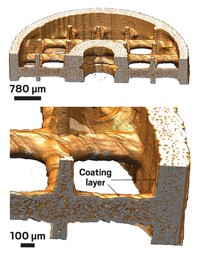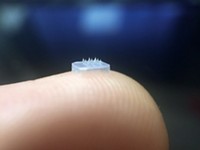Advertisement
Grab your lab coat. Let's get started
Welcome!
Welcome!
Create an account below to get 6 C&EN articles per month, receive newsletters and more - all free.
It seems this is your first time logging in online. Please enter the following information to continue.
As an ACS member you automatically get access to this site. All we need is few more details to create your reading experience.
Not you? Sign in with a different account.
Not you? Sign in with a different account.
ERROR 1
ERROR 1
ERROR 2
ERROR 2
ERROR 2
ERROR 2
ERROR 2
Password and Confirm password must match.
If you have an ACS member number, please enter it here so we can link this account to your membership. (optional)
ERROR 2
ACS values your privacy. By submitting your information, you are gaining access to C&EN and subscribing to our weekly newsletter. We use the information you provide to make your reading experience better, and we will never sell your data to third party members.
Biological Chemistry
Hydrophobic Mesh Slows Drug Release
Air displacement controls water flow through a hydrophobic polymeric material, enabling extended release of an anticancer drug
by Elizabeth K. Wilson
February 6, 2012
| A version of this story appeared in
Volume 90, Issue 6
\
\
The anticancer compound SN-38 releases slowly from a superhydrophobic polymeric mesh.
A superhydrophobic polymeric mesh, in which the displacement of air slows the progress of infiltrating water, has been designed as a new type of slow-release drug delivery system (J. Am. Chem. Soc., DOI: 10.1021/ja211148a). A team led by Boston University’s Mark W. Grinstaff used an electrospinning technique to create the mesh from hydroxycaproic acid, glycerol, and stearic acid. The mesh, which has an extremely high surface area and resembles a jumble of spaghetti, can be loaded with a drug. Air serves as a barrier to help control how fast water seeps through the mesh, slowing down drug release to weeks. The researchers tested the concept by loading the mesh with SN-38, the active form of the cancer drug irinotecan. They placed the loaded mesh in a soup of biologically relevant compounds, such as albumin, to see how a biological environment might affect the drug’s release rate. They then added human lung cancer cells to the mix and found that the drug killed the cancer cells slowly and continuously over several weeks.





Join the conversation
Contact the reporter
Submit a Letter to the Editor for publication
Engage with us on Twitter